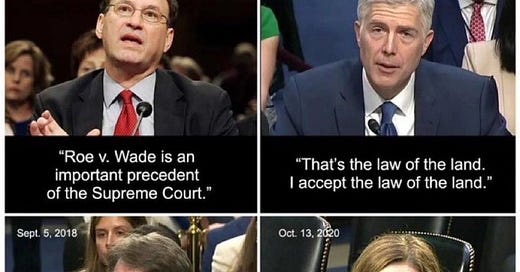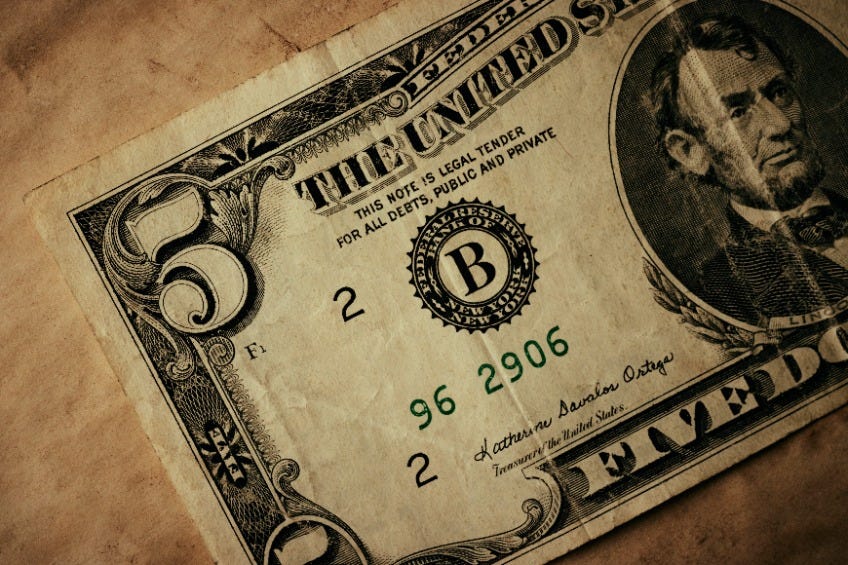The CHOICE: The Supreme Court is eroding our rights and endangering our lives.
This SCOTUS is brought to you by radical Republicans. It is up to the Dems to fix it ASAP in 2025.
Issue #657 The Choice, Tuesday, July 2, 2024
Help us to reach our July 2024 goals: +125 total subscribers and +75 paid subscribers:
Please share and subscribe to help us grow this publication.
If you like us, REALLY like us, please click the “Like” button at the end of this post!
Also, please scroll to the end of this post for other ways to financially support us and We Are Speaking with our books and courses.
We appreciate your support!
This picture also includes Samuel Alito, who was nominated by George W. Bush, and also lied during his Senate hearing.
THEY LIED.
When SCOTUS (Supreme Court of the United States) Associate Justices Neil Gorsuch, Brett Kavanaugh, and Amy Coney Barrett appeared at their nomination hearings before the Senate, they all said—under oath—that they agreed with the long-standing principle of stare decisis, which means “to stand by things decided” in Latin. All three justices were nominated by another serial liar, Donald J. Trump.
In 2022, these three justices were part of the majority that struck down the nearly fifty-year-old precedent decision of Roe v Wade that ensured that women could have the reproductive care - including miscarriage assistance and necessary abortions - that their doctors, not politicians, decided was necessary.
Then, in just the last week, the SCOTUS struck down two more long-standing laws and legal principles: the Chevron Doctrine and presidential immunity.
In between, the SCOTUS also decided that it was OK for municipalities to put homeless people in jail if there were no other places for them to stay.
Jail the Homeless?
The recent Supreme Court decision concerning the jailing of homeless individuals who have nowhere to stay has reignited debates about civil rights, public safety, and judicial deference to local government policies. This ruling intersects complex issues of constitutional law, human dignity, and the practicalities of urban governance, particularly in cities facing significant homelessness crises.
The primary legal issue concerns whether individuals experiencing homelessness can be penalized for sleeping in public spaces when they have no access to shelter. This issue touches on the Eighth Amendment of the U.S. Constitution, which prohibits "cruel and unusual punishments."
Of course, we already know that for Republicans and other far-right-wing people like the six Republican-appointed justices, the cruelty is the point.
Cities will need to reconsider their approaches to managing homelessness. Policies might shift towards providing more shelters and supportive services rather than punitive measures.
Municipalities may need to allocate more resources towards building shelters, providing mental health services, and other supportive measures to comply with this legal landscape.
The Chevron Doctrine: A Critical Examination of Judicial Deference and Its Potential Erosion
The Chevron Doctrine stood as a pivotal principle shaping the relationship between administrative agencies and the judiciary. Originating from the seminal 1984 Supreme Court case, Chevron U.S.A., Inc. v. Natural Resources Defense Council, Inc., this doctrine fundamentally influenced how courts review agency interpretations of statutory mandates. However, in an era marked by increasing judicial activism and ideological polarization, the erosion of the Chevron Doctrine raises significant concerns about the future of administrative law and the broader implications for our rights and safety.
The Chevron Doctrine, at its core, embodied a two-step test for judicial deference to agency interpretations of ambiguous statutes. The first step required the court to determine whether Congress's intent on the precise question at issue was clear. If congressional intent was unambiguous, that intent must be followed. However, if the statute was silent or ambiguous, the second step required the court to defer to the agency's interpretation as long as it was "reasonable" or "permissible."
This framework acknowledged the expertise of administrative agencies in specialized fields and their capacity to adapt regulations in response to evolving conditions. It recognized that agencies possess the technical expertise and operational experience that courts lack.
This most recent SCOTUS decision says that judges know more than the experts and can decide the implications, rules, and regulations of agencies such as the Food and Drug Administration (FDA), the Federal Aviation Administration (FAA), and the Environmental Protection Agency (EPA). This shift can be seen as part of a broader trend toward judicial activism, where the Court exerts greater influence over policy areas traditionally governed by agencies.
The erosion of the Chevron Doctrine carries profound implications for administrative law. If courts increasingly substitute their judgment for that of agencies, the balance of power between the branches of government could be fundamentally altered. Agencies may find their regulatory authority weakened, leading to less effective implementation of complex and technical statutory schemes.
Increased judicial intervention could result in a patchwork of rulings that complicate compliance and enforcement efforts, undermining the stability essential for both economic and environmental planning.
Perhaps most troubling is the potential impact on public welfare and individual rights. Agencies like the Environmental Protection Agency (EPA), the Federal Communications Commission (FCC), the Federal Aviation Administration (FAA), and the Occupational Safety and Health Administration (OSHA) play critical roles in safeguarding public health, safety, and welfare. Their ability to interpret and enforce regulations is vital for addressing issues ranging from environmental protection to workplace safety.
The Chevron Doctrine has long served as a cornerstone of administrative law, ensuring that agencies with specialized expertise can effectively implement and interpret complex statutes. As the Supreme Court curtails this doctrine, the stakes are high. The implications extend far beyond administrative governance, touching on the fundamental balance of power, regulatory certainty, and the protection of public welfare and individual rights.
Presidential Immunity and Unchecked Presidential Power
The Founders of the United States were acutely aware of the dangers of unchecked executive power. The experiences of colonial rule and the tyranny of British monarchs were fresh in their minds as they convened to draft the Constitution. Consequently, they sought to create a system that would prevent the rise of a despotic executive while ensuring that the President had sufficient authority to govern effectively.
In Federalist No. 69, Alexander Hamilton drew a clear contrast between the proposed American President and the British King, emphasizing the President's limited powers. Hamilton argued that the President would be "liable to be impeached, tried, and upon conviction . . . removed from office, and would afterward be liable to prosecution and punishment in the ordinary course of law."
James Madison, known as the "Father of the Constitution," highlighted the importance of checks and balances. He believed that the separation of powers would prevent any one branch from overpowering the others. Madison's vision was that while the President had specific, delineated powers, these powers were subject to oversight and restraint by the legislative and judicial branches.
Meanwhile, Justices Thomas and Alito, whose wives are deeply involved in overturning the Constitution to assist Trump in meeting his goal of being “a dictator on Day One,” did not recuse themselves from this decision.
The case of Trump v. the United States delves deeply into the doctrine of presidential immunity and its implications. Although the case as mentioned isn't officially titled "Trump v. the United States" in legal records, we can infer that this discussion likely pertains to the broader legal context around President Trump's claims of immunity from various investigations and legal proceedings.
The current Supreme Court waited six months and until the very last day of the term to issue this ruling.
Already the convicted felon Donald J. Trump is trying to use this ruling to reverse prior decisions, including the decision involving the rape and repeated defamation of E. Jean Carroll.
The question is: which of these criminal acts could be considered part of a president’s “official duties” and who decides?
Trump once famously said, “I could stand on Fifth Avenue and shoot somebody and nothing would happen to me."
Yes, it’s that bad and worse.
Throughout the entirety of American history, foundational and legal principles and opinions have stated that no one is above the law and the president is not a king.
It is because people allowed Trump to win the Electoral College in 2016 (he lost the popular vote as he has always done) that we are in this mess.
Associate Justice Sonia Sotomayor wrote the dissent for the presidential immunity case:
“Today’s decision to grant former Presidents criminal immunity reshapes the institution of the Presidency,” Sotomayor wrote in dissent. “It makes a mockery of the principle, foundational to our Constitution and system of Government, that no man is above the law.”
Sotomayor, writing in a scathing tone, said the court would effectively allow presidents to commit clear crimes without punishment, an expansion of presidential powers that puts democracy at risk. She and fellow liberal justice Ketanji Brown Jackson lay out hypothetical ways the court’s ruling could create crises in the US.
“The President of the United States is the most powerful person in the country, and possibly the world. When he uses his official powers in any way, under the majority’s reasoning, he now will be insulated from criminal prosecution,” Sotomayor wrote.
“With fear for our democracy, I dissent,” Justice Sotomayor concluded.
Our paid subscribers are encouraged to comment on this post.
Let’s discuss these facts in our community on Substack Notes. You can also read other Substack publications without subscribing to them when you join Notes.
This post is free to read for three days. To have access 365/24/7 to our full archive, comment on our posts, and financially support “We Are Speaking” for no more than $5 per month, please subscribe at the paid level. You will receive a 7-day FREE trial!





